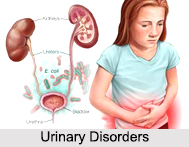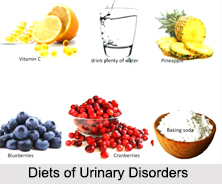 Urinary Disorder is basically urinary tract infection (UTI) which is a bacterial infection that affects any part of the urinary tract. In this disease, the bacteria get into the bladder or kidney and multiply in the urine and cause a UTI. Urinary Disorders are the results of some infections caused by certain bacteria.
Urinary Disorder is basically urinary tract infection (UTI) which is a bacterial infection that affects any part of the urinary tract. In this disease, the bacteria get into the bladder or kidney and multiply in the urine and cause a UTI. Urinary Disorders are the results of some infections caused by certain bacteria.
The urinary disorders are the diseases caused by some bacteria that are if properly diagnosed can be treated in time. One of the main reasons of the infections is unhygienic activities and improper cleanliness. In addition to follow the medicines the patients suffering from urinary disorders are advised to follow personal hygiene like toilet, bathing and menstrual habits which play an important role in developing urinary disorders and should be dealt with proper care.
Types of Urinary Disorder
The most common type of UTI is a bladder infection which is also often named as cystitis. Another kind of UTI is a kidney infection, known as "pyelonephritis" which is much more serious. There are some other types of UTIs that are
Uncomplicated Urinary Tract Infections
Complicated Urinary Tract Infections
Recurrent Urinary Tract Infections
Asymptomatic Urinary Tract Infection
Acute Urethral Syndrome
 Causes of Urinary Disorder
Causes of Urinary Disorder
The causes of Urinary disorder may also include painful or frequent urination, bedwetting, or the need to urinate frequently throughout the night. Incontinence may be caused by infection, a urinary tract abnormality, oestrogen loss after menopause, sagging pelvic muscles or a neuromuscular disorder. A bladder infection is the most common cause of transient incontinence. Other reversible factors that can contribute to incontinence include conditions like a severe infection such as pneumonia or impaired mobility because of a leg or hip fracture. Additional causes of transient incontinence include excess intake of alcohol or beverages that contain caffeine and conditions that can result in irritation of the bladder or urethra, such as "atrophic vaginitis" or severe "constipation". Moreover, conditions in the lower urinary tract such as an enlarged prostate; and conditions that permanently impair mental function or mobility are also hold responsible for UTI.
Symptoms of Urinary Disorders
The symptoms of urinary disorders include the urge to urinate frequently, which may recur immediately after the bladder is emptied. The patient may experience "Nocturia" which is the need to urinate during the night. It is followed by a painful burning sensation or "Urethritis". Patients suffering from UTI may feel pain, discomfort or pressure in the lower abdomen that can feel bloated. Another symptom of urinary disease is the cloudy and foul-smelling urine which often has a strong smell, protein or blood in the urine. This is a sign of "Pyuria" or a high white blood cell count in the urine, and is a very reliable indicator of Urinary Tract Infections.
Diagnosis of Urinary Disorders
Following the symptoms of urinary disorders, the diagnosis of the diseases can be confirmed through some tests recommended by the doctors. After observing the episodes of incontinence and the estimation of urine leakage, the patient is advised to go for some tests like Ultra Sonography or urinary catheterization, cystoscopy and Urodynamic tests. A pelvic examination in women can help identify problems that may contribute to or cause incontinence, such as atrophy of the lining of urethra, prolapse of the bladder and damage affecting the nerves to the bladder.
Treatments of Urinary Disorders
The urinary disorders though painful and problematic, the diseases have many ways of treatments. In alternative medicines, urinary disorders are treated and the results are effective as the case studies have revealed. Urinary disorders are treated in Naturopathy, Herbal therapy, Hydrotherapy, Aromatherapy, Juice therapy and Reflexology. Even dietary changes can lessen the acuity of the diseases. Dietary changes include avoiding citrus fruits and spicy foods, and decreasing intake of refined starches and sugars, vegetable fats, onions, beans and chocolate. Urinary diseases are treated with a juice therapy that allows the patient to consume cranberry juice per day which can result in decreasing the amount of bacteria in urine.




















